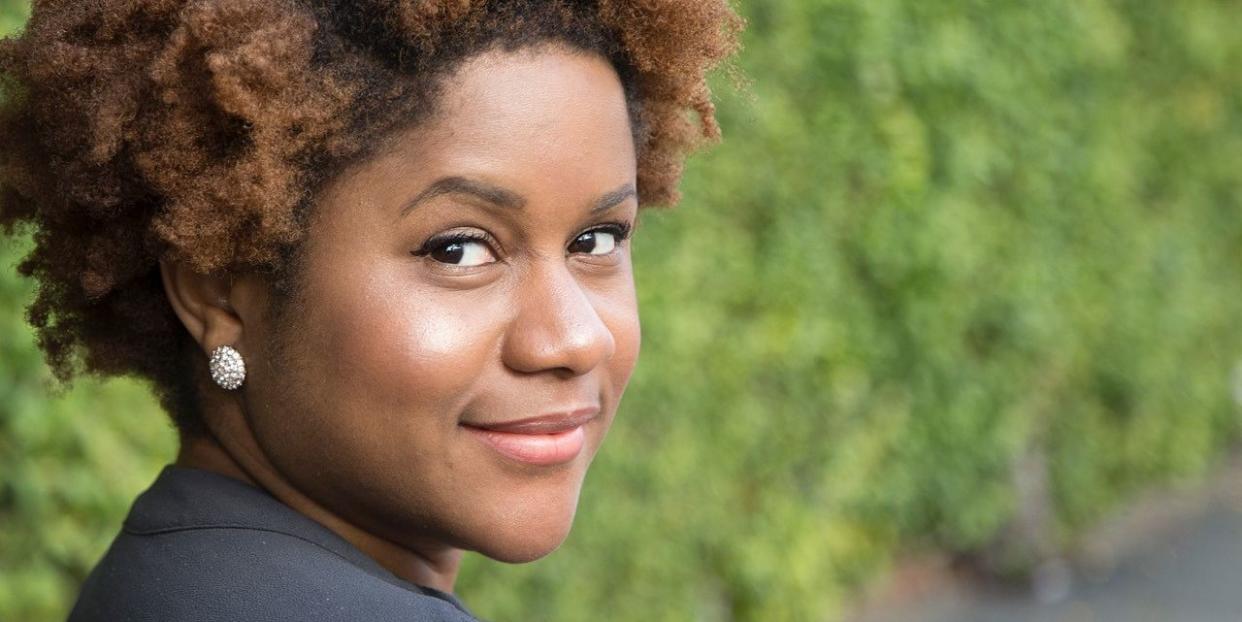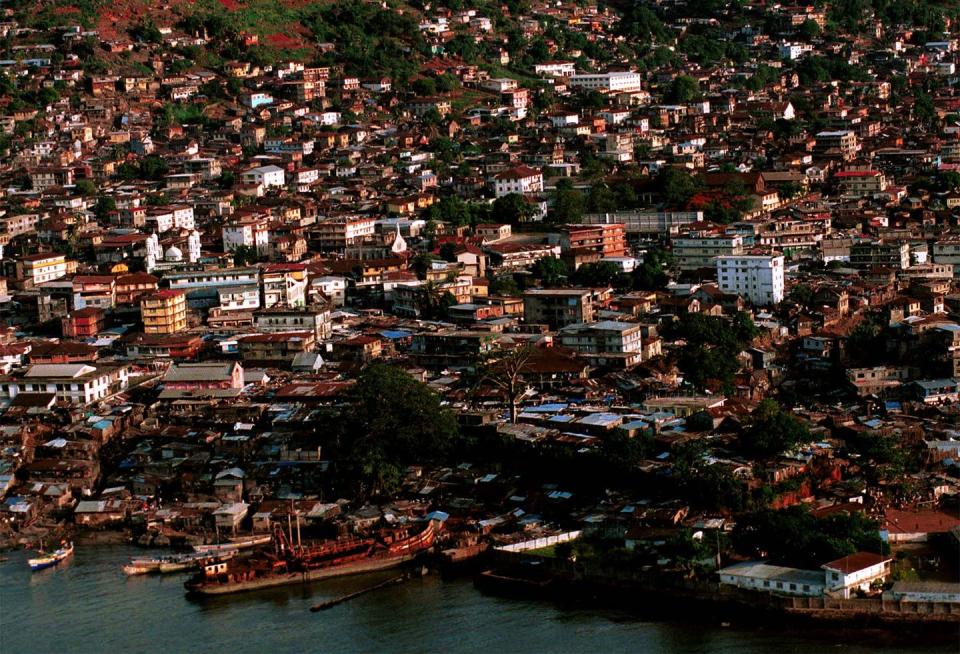Namina Forna’s ‘The Gilded Ones’ Brings the Beauty and Tragedy of Sierra Leone to YA

- Oops!Something went wrong.Please try again later.
On the morning she missed the call, Namina Forna was at home, distracted by her own breathing. “You've been here before,” was her mantra. “You're going to breathe, and you're going to continue. Because that's what you do.”
She’d spent the past decade spinning a piece of her birthplace, Sierra Leone, into a novel, centered around a young girl with brown skin and golden blood who lived in a fantastical version of Forna’s homeland. But this was 2012, years before Black Panther and Children of Blood and Bone pushed Afrofuturist film and literature into a supposedly more "marketable" limelight.
“Everyone was like, ‘Oh my gosh, Africa can be this magical place,’” Forna says, recalling the immediate aftermath of 2018’s Black Panther landing in theaters. “It took a movie for people to be able to see that. But I think that my privilege, as someone who was born and raised in Africa, is I grew up always with that understanding. It was never a question for me.”
Still—2012. Forna submitted drafts. Rejections followed. Over the course of that decade, Forna felt there was little room for someone like her: a female African immigrant who believed it was “almost embarrassing to claim” that, in America, Africa should be viewed with anything like reverence.
So when the call came that March morning in 2019, she was too busy making herself breathe, meditate, and anticipate rejection, that she missed it entirely. She called her agent back, and heard that Delacorte Press would be purchasing her book for a “significant six-figure” sum.
“I dropped to the floor crying,” Forna tells me now.
The story would become The Gilded Ones. Published February 9 in the U.S., the young-adult novel follows 16-year-old Deka, whose patriarchal society of Otera demands girls participate in a bleeding ceremony before they can rightfully join the community. When Deka inadvertently reveals herself as some kind of monster—her blood runs gold rather than red—she’s forced to choose between surviving as an outcast or as a warrior. In selecting the latter, she ventures to the capital city to spar on behalf of the emperor.
The day after the book was released, Makeready announced it had optioned The Gilded Ones for a film trilogy, with Forna as its scriptwriter and Lovecraft Country showrunner Misha Green as a producer. This, only hours after The Gilded Ones ascended to the top of Amazon’s young-adult fantasy charts and soon became a New York Times bestseller.
It feels like a fitting end to a beginning that started with a young Forna landing in Georgia in the late ‘90s and finding it completely devoid of magic. She’d grown up on a marsh, surrounded by hills and rivers and coast, and when the water receded in the afternoon she could walk directly to the beach. She could sit on the veranda, breathe in the salt and watch whales rise and dive in the distance. In Sierra Leone, she’d lived something like royalty—or at least, something far from poverty.
Her father was in politics; her mother had her own law practice. They had an elegant home with servants; the family took frequent holidays to Europe. But in 1991, the Sierra Leone Civil War was only just beginning, and Forna describes growing up in the country as if unease had embedded itself in her body. “Your skin crackles all the time,” she says. “I grew up a bit of a fearful child.”
When Forna was six, her mother left their home of Freetown to go to the U.S. and restart her legal education at Georgetown University. Forna remained with her sister, father and grandmother, who insulated Forna from the growing conflict by telling her tales of faraway lands. But the reality was getting harder to ignore. On one particular evening, she fell asleep in the family’s guest house, and when she emerged, long past dusk, the entire neighborhood was outside, awake and “freaking out.” A war was brewing. Everything, even neighborly conversation, felt tinged with panic.
Suddenly, there was a curfew—she couldn’t leave the house past 6 p.m. Friends and political allies of her father started disappearing. She wasn’t allowed to walk to school anymore; her family’s driver picked her up and dropped her off. She wasn’t allowed to leave home without a chaperone. When her father got word the rebels would arrive in Freetown within days, he told Forna she and her sister were going to America.

Forna assumed she was headed on another holiday. The only hint she got otherwise was an instruction to “pack winter clothes,” which she considered an odd request for a vacation. Days later, she arrived in Georgia to live with their mother, and she was devastated to realize she had to stay. In Sierra Leone, her family was privileged. In America, they were poor. In Sierra Leone, they were African. In America, they were Black.
Her American teachers couldn’t understand what they saw as contradictions: Forna was from Africa, but she had owned nice things. She had left because of a war, but she wasn’t a refugee. Her mother had owned a law practice back in Sierra Leone, but here she had to start from scratch, attending law school while waitressing to pay the bills. Forna had grown up in luxury, but in America she possessed only two sets of clothing. Her teachers accused her of being “a pathological liar.” Surely none of this was true. Surely she needed counseling.
And then there was the American news. Watching the conflict back home play out on CNN felt like a sick joke, that feeling of her skin crackling now a full out-of-body experience. She hadn’t understood the violence when she’d walked those same streets, but now they were the subject of national news.
Forna had always loved reading—she read the Bible cover to cover when she was four years old—and it became a shy, detached girl’s salvation. When it was time for her to go to university, she attended Spelman College, a historically Black liberal arts college in Georgia, where she was required to study African Diaspora in the World as a freshman. After years of microaggressions in Georgia, the class reaffirmed what she already knew about Africa: It was, in fact, a magical place.
“For me, when I came to America, there was this rewriting,” Forna says. “The American understanding of Blackness, I did not have it. It was only when I came to America that that title was put upon me, and it had a set of expectations along with that.
“When I came to America, I started doubting myself. I was like, ‘Wait, maybe people in Africa only do live in huts.’ That's the gaslighting America does, especially as it relates to Blackness. But when I went to Spelman, those classes started un-rewriting the gaslighting because it was like a, Oh, wait, I remember this. This was true. You're so inundated by the media here that you forget who you are and what you are.”
At Spelman, she nurtured the idea that would become The Gilded Ones. She probed the concepts of femininity she’d developed in Sierra Leone and at Spelman. There was no denying the patriarchy in Sierra Leone had tried to convince her she was worthless, and women in her own family had attempted to uphold that idea: Her own grandmother had believed FGM (female genital mutilation) would make her a better, purer woman. Forna’s parents shut that down fast: “Over our dead bodies,” they'd said.
The sexism she witnessed in Georgia was perhaps more discreet, though no less insidious. She and her classmates were slut-shamed for wearing low-cut tops. She was forced to change out of a tight pair of pants for fear it would tempt her male classmates. The short-sightedness of it all made Spelman, an all-female campus, seem like an oasis.
So when Spelman gifted her with the words and the confidence to understand her experience, Forna knew she wanted to write a feminist fantasy with a world based in large part on Sierra Leone. “I think particularly for kids and for people who, like me, grew up in places and times when it's not safe, fantasy provides you that escape,” Forna says. “It provides you that place where nothing can happen while you're there. I want to hold people in my world and give them what all my favorite authors gave to me, because I don't know how I would have lasted without fantasy.”
Now, Forna writes primarily for television and film, mostly on projects with an Afrofuturist bent, which is why adapting The Gilded Ones for the screen is such an electric idea.
“I come from a place where illiteracy rates are super high, but we have a huge cinema culture,” Forna says. “People may not be able to read my book, but they can at least watch my movie.”
Clearly, The Gilded Ones has hit its mark. A New York Times bestseller, the book has earned praise for being "an adventurous and relevant fantasy," “bold and powerful and utterly gripping,” “amazingly entertaining and fast-paced." One Amazon reviewer, in particular, wrote, “As an African, seeing names I recognize brought me a special kind of joy and deep pride.” The book is set to become one of three in the Deathless trilogy, which will expand upon Deka’s world and give Forna plenty to do in the next few years. For that, she’s thrilled. In Otera, she’s found a home where she can stay.
You Might Also Like

